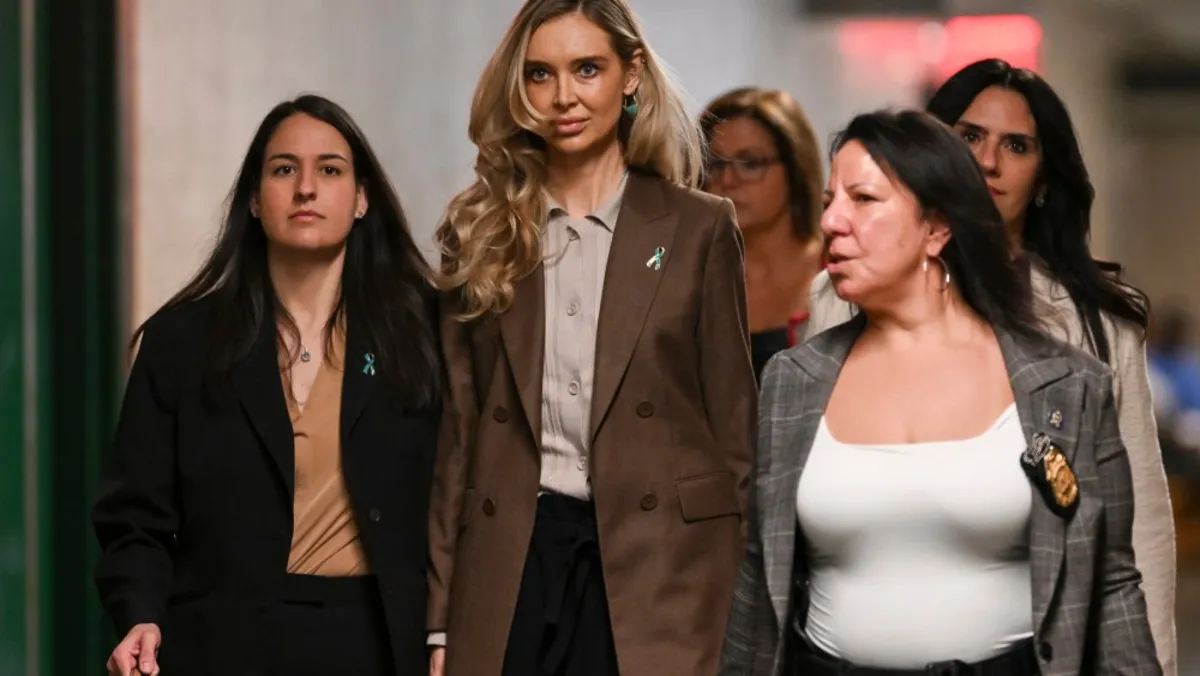
Kaja Sokola, a former Polish model turned psychotherapist, recently spent five intense days testifying in Harvey Weinstein‘s retrial in New York. Her testimony recounted two alleged instances of sexual assault: one in 2002, when she was just 16 years old, and another at a Tribeca hotel in 2006. On June 11, a New York jury acquitted Weinstein of the charges related to Sokola’s allegations. However, Sokola revealed that the most challenging aspect of the months-long retrial was not the courtroom drama itself but the personal betrayal from her sister.
In an emotional interview with Variety, Sokola stated, “The devastating part was not the trial itself — it was the betrayal of my sister.” She expressed her confusion and hurt regarding her sister Ewa’s actions during the trial, saying, “I truly don’t understand how she could — how anyone could do something like that.” On her fourth day on the stand, the defense presented a private journal that contained documentation of people who had allegedly assaulted Sokola but notably omitted any mention of Weinstein. This journal, which Sokola described as a “workbook for addiction treatment,” was provided to the defense by Ewa.
During her testimony, Sokola pleaded, “Please don’t read that. This is my personal things.” Though Weinstein was mentioned in an entry regarding “Harvey W,” where Sokola indicated he had “promised help,” she asserted that the defense misused the journal to cast doubt on her allegations. “This felt very unjust and very hurtful… These kinds of tactics are just showing how dirty of a game it is for them,” she explained.
Sokola described her relationship with her sister as strained, stating, “My sister was trying to do a lot of harmful things to me in the past.” She indicated that financial issues had played a significant role in their troubled relationship. On the other side, Michael Cibella, Weinstein's attorney, asserted that the journal did not contain any allegations of abuse against Weinstein, emphasizing, “We had this journal which had allegations of sexual abuse against four other people.” Cibella claimed that the jury’s decision not to believe Sokola reflected her credibility.
In a twist, Ewa Sokola testified for the prosecution, confirming that she and Kaja had a lunch meeting with Weinstein at a Tribeca hotel in 2006. During this meeting, Kaja took an elevator ride with Weinstein while Ewa remained at the table. Upon Kaja's return, Ewa noted that her sister seemed to be under “extreme tension.” However, during cross-examination, Ewa admitted that Kaja had never expressed any negative feelings about Weinstein before 2017, stating, “She was proud of knowing him.”
In their closing argument, Weinstein's attorney, Arthur Aidala, referenced Ewa's testimony to argue that she supported their case theory, suggesting that everything was fine between Kaja and Weinstein. Kaja Sokola speculated that her sister may have been influenced by a friend who worked for Aidala’s firm, highlighting the complexities of familial relationships in high-stakes legal battles. “It’s very sad and unfortunate when you see families being broken up because of these kinds of reasons,” Sokola lamented.
Despite not testifying in Weinstein’s previous trial, Kaja’s identity was revealed during the retrial, following an appeals court decision that overturned Weinstein’s previous convictions. She described seeing Weinstein in court as a sobering experience, stating, “He looked miserable, and he looked like a sick, old man.” Kaja emphasized the importance of accountability, saying, “It’s not my story. I’m not on trial. It’s not about me. It’s about him and him being accountable for what he did.”
Although Weinstein was acquitted of the charge related to Sokola, he was convicted of one count of committing a criminal sexual act in the first degree against former TV production assistant Miriam Haley. Following this verdict, Kaja expressed her disappointment but maintained that the overarching goal was to hold Weinstein accountable. She stated, “I was hoping for something else, but it still didn’t change the whole scenario for me — because the whole point is to put this man in jail.”
In response to the jury’s decision, Aidala remarked on Sokola’s reaction, criticizing her for what he perceived as a celebratory response to the verdict that acquitted Weinstein of her charges. However, Sokola’s attorney, Lindsay Goldbrum, clarified that the jury's ruling did not equate to a belief that Kaja was lying. “The standard is proof beyond a reasonable doubt,” she explained, stressing the challenges of the criminal justice system.
As Weinstein faces a potential sentence of up to 25 years for his conviction in the Haley case, Kaja Sokola remains resolute in her message to Weinstein and his legal team: “I want to tell them that we won. We won. Don’t try to split women apart and tear them down individually.” Her testimony and experiences shed light on the ongoing complexities surrounding sexual assault cases, familial relationships, and the broader implications of the MeToo movement.